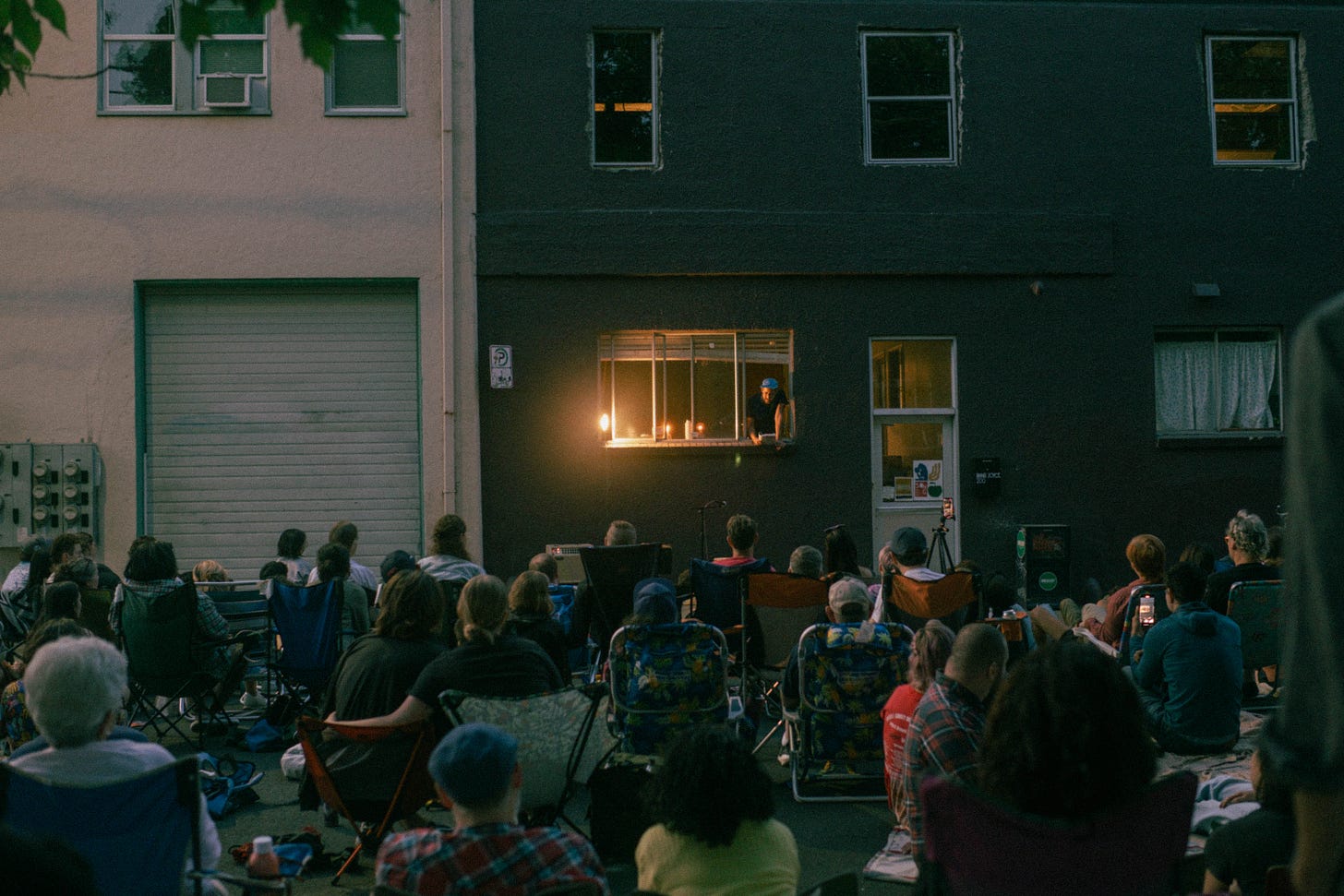Put more emphasis on civic love in Portland
While Portland’s problems receive increased attention, the unmeasurable but powerful attributes that make the city special are mostly ignored
Last Thursday at twilight, approximately 300 people provoked by a simple Instagram post or encouragement from someone they knew showed up beneath a second-story window in Portland’s SE Belmont neighborhood to listen to Anis Mojgani recite poetry. We brought blankets and fold-up chairs and spontaneously and without resistance commandeered a stretch of SE Yamhill Street and the sidewalks on its north and south sides.
Anis — currently Oregon’s Poet Laureate — leaned awkwardly out the unremarkable sliding window and talked to and with us. There was no sound system, no organizational sponsor, nothing official anywhere in sight. For over an hour, as dusk turned to dark, we listened and laughed and clapped and looked around and took deep, reflective breaths and felt lucky – yes, I said it: lucky – to live in Portland, Oregon, in the summer of 2023.
I don’t know of any other place in the country where gatherings quite like this happen with such regularity and power. I also don’t know of any U.S. city (save maybe, recently, San Francisco) that so regularly sees its delights ignored and its challenges highlighted and amplified. Portland’s challenges are unquestionably serious, and it is important to attend to them in order to try and improve our city, our state, and the lives of everyone here. Lucas Mansfield’s recent Willamette Week story on Portland’s Fentanyl Corner and April Erlich’s OPB story about Oregon’s extreme housing shortage are just two examples among far too many to list (or even read) of how serious Portland’s problems are and what we might do to address them.
But I also want to note that there appeared to be no journalists at the recent Poems at Sunset Out a Window, no investigation of the conditions that make events like this not only possible but regular here in Portland. There was no large local or national coverage of Oregon Humanities’ Civic Love Ride in mid-July or the hundreds of other Pedalpalooza rides throughout the summer. There have been no stories on the late-night dance parties by the old cement factory near the Willamette, little attention to the strange and enduring vitality of the Saturday Market in Old Town, almost no mention of the proliferation of pianos around the city or the people who play them or gather to listen.
This is not an economic argument, and it is not grounded in hard data (as John Tapogna’s, Gary Conkling’s, and Mark Hester’s more conditional defenses of Portland have been in this space over the past few years). Instead, I’m making an argument based on experience and in favor of attention and recognition. I am asking that we look around this city and the various neighborhoods we move through and notice not only the difficult and the bad but also the remarkable and uniquely good things that Portland is home to, as well as the range of ways so many people feel home here.
At the Civic Love Ride a couple weeks ago, 75 cyclists stopped at a few spots in NE Portland to talk with each other and to hear about different forms of civic love from Suzanna Kassouf, a teacher at Grant High School; JR Rymut, who runs a youth program called Haunt Camp in Enterprise; and Madi Carlson, from the Street Trust. We also heard from Rozzell Medina, who, along with colleagues at Oregon Humanities, puts on a wide range of events like the Civic Love Ride, including free college humanities courses for adults living on low incomes, participatory community conversations, trainings that equip community members to lead tough and necessary conversations, and other programs that get people together to explore and celebrate imaginative and collaborative work happening throughout Oregon and the Pacific Northwest.
In the face of so much local and national news about Portland, these kinds of things are what I want to highlight. There is so much imaginative and collaborative activity in Portland, and so much that is uniquely welcoming and generative about these activities and this place and the way they go together. This feels important to say here, in this journalistic and political space: the good stuff too, the uniquely Portland stuff, the window poetry and the group bike rides and the pianos and the street fairs and the many other instantiations of Portland’s deep and exceptional culture of getting together in public — these deserve our attention, our coverage, our support, and maybe even our love.




